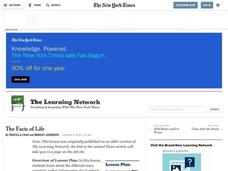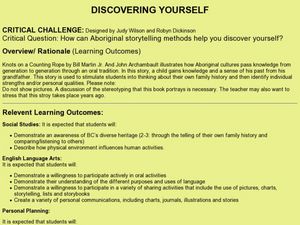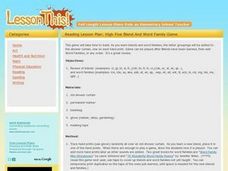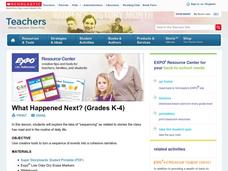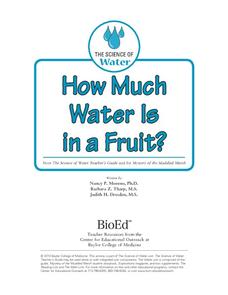Baylor College
Needs of Plants
What better way to learn about plant life than by creating a class garden? Young botanists start with a brief discussion about radishes before planting seeds and watching them grow. To determine the importance of water,...
Curated OER
Hard Word with the Little Red Hen
Students complete a unit using the story of the Little Red Hen to learn the storybook reading format as well as improve their reading and social skills. In this storybook lesson, students complete five lessons using the story of the...
Curated OER
The Facts of Life
Students explore the different ways scientists gather information about extinct animals. They utilize these methods to create illustrated story books about a particular extinct animal.
Curated OER
Farms And Cities
Students differentiate the differences of living on a farm or in a city. They do this with the use of coloring pictures and have group discussion about each picture to identify characteristics and identify where the picture is from. The...
Curated OER
Discovering Yourself
Students explore Aboriginal storytelling. In this literature lesson, students read Knots on a Counting Rope and then create a story line as they discuss the attributes of Aboriginal culture. Students retell the story in their own words.
Baylor College
Healthy Homes
Meant to follow a lesson plan about how concentrated air particles can be inside of a building, this resource gets individuals to assess the possible air pollutants in their own homes. They take home a worksheet and circle spots on it...
Curated OER
Farm Animals-Cows, Pigs, Horses
Here is a good lesson for kindergartners that combines technology, literature, and art. In it, learners take a close look at some famous farm animals. They make the sounds that each animals makes, they use the internet to find pictures...
Curated OER
Now That's a Problem!
Help learners improve multiplication skills by skip counting and creating their own multiplication word problems. They will begin by practicing skip counting and then illustrate word problems using a software program. Pixie is a software...
Curated OER
What Makes Our Community Special?
Explore websites, complete research, and use technological tools to create a final multimedia presentation on what makes a community special. Learners of all ages work with a partner to research an interesting aspect of their community,...
Curated OER
High Five Blend and Word Family Game
Practice using word blends and learning about word families by participating in a class game. Learners will collaborate as teams in a game by throwing beanbags onto a shower curtain with word blends on it. They will say the sound their...
Scholastic
What Happened Next? (Grades K-4)
Explore the structure of narrative writing with this fun, collaborative lesson. Start by reading aloud a short story, asking small groups of learners to fill in key events on a large story board prepared on the class whiteboard....
Baylor College
What's Is Soil Made Of?
It's time to roll up those sleeves and get a little dirty in the second lesson of this series on the science of food. Investigate where plants and animals get the minerals they need to live in this two-part exploration of soil. First,...
Baylor College
Fungus Among Us
In order to learn that mold spores can be found in the air, observers grow bread mold and make observations for a few days. Afterward, they participate in a class discussion to arrive at the knowledge that bread spores are present in the...
Stew Leonard's
Stewie the Duck Learns to Swim
Make a splash with an interactive storybook that emphasizes water safety. Directed at preschoolers and primaries, the ducky tale and games reinforce the rules of wearing a life vest whenever near water, making sure to have a supervising...
Baylor College
Animals' Needs
Explore the wonderful world of earthworms as your class learns about the requirements of animal life. After building soda bottle terrariums, students observe worms over the course of a couple weeks, building an understanding that all...
Baylor College
Do Plants Need Light?
Turn your classroom into a greenhouse with a lesson on plant growth. First, investigate the different parts of seeds, identifying the seed coat, cotyledon, and embryo. Then plant the seeds and watch them grow! Measure the new plants...
Baylor College
Pre-Assessment: Earth's Energy Sources
A ten-question, multiple-choice quiz assesses what your elementary earth scientists know about the atmosphere both before and after a unique unit on global atmospheric change. Make sure to check out the activities and lesson plans...
Baylor College
How Much Water Is in a Fruit?
Compare the volume of an orange to the volume of liquid that can be extracted out of it. Also compare the mass of an apple before and after it has been dried out. In both of these activities, children find that there is an appreciable...
Baylor College
Plant Parts You Eat
Plants provide a variety of delicious foods essential for human survival. In the fourth activity of this series on food science, young scientists investigate common fruits, vegetables, and grains in order to determine which plant part is...
Baylor College
Bio Build-up
Trace pollutants through the environment in the seventh lesson of this series on the science of food. Looking at a picture of the plants and animals in an aquatic ecosystem, learners use dot stickers to represent harmful chemicals as...
Baylor College
They're Everywhere: Bacteria
Totally gross out your class with the eighth lesson in this series on food science. Explore the microscopic world of bacteria by taking swabs of different classroom objects and growing colonies in petri dishes. An engaging activity that...
Baylor College
What's That Food?
Get things cooking with the first lesson in this series on the science of food. Working in small groups, young scientists make and record observations about different mystery foods. These descriptions are then shared with the class and...
Baylor College
Healthy Snacks
Assess your pupils' ability to identify healthy food choices in the final lesson of this series on food science. Given five different food labels, young nutritionists will rank them from most to least healthy, supporting their choices...
Baylor College
What is Air? Pre-Assessment
First, estimate existing knowledge about air with a class discussion. Then, hand out a 10-question pre-assessment quiz to record how much pupils know to compare to their knowledge later. This will also give mini meteorologists the...


